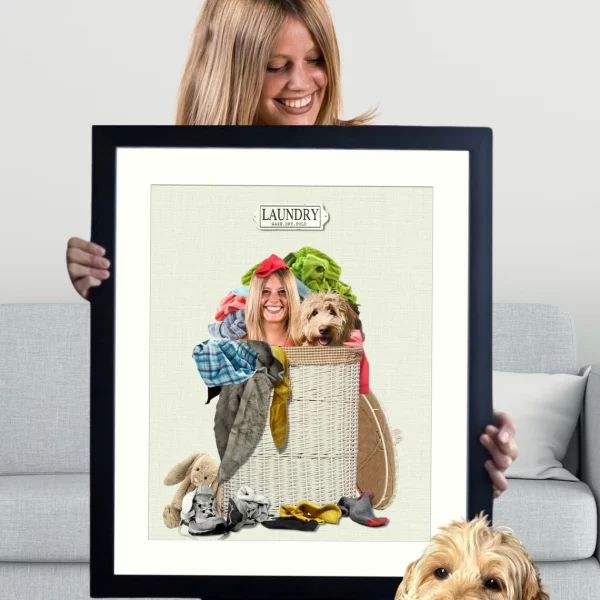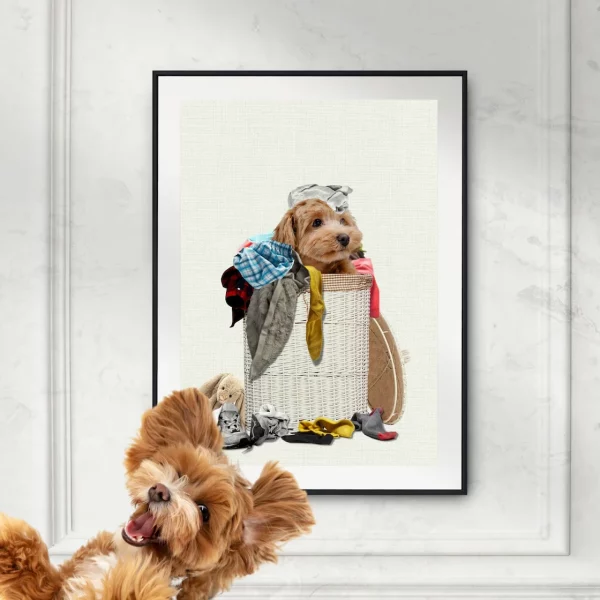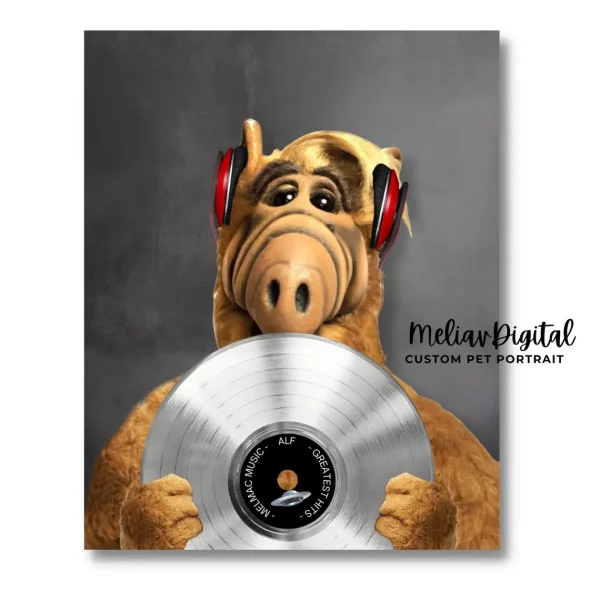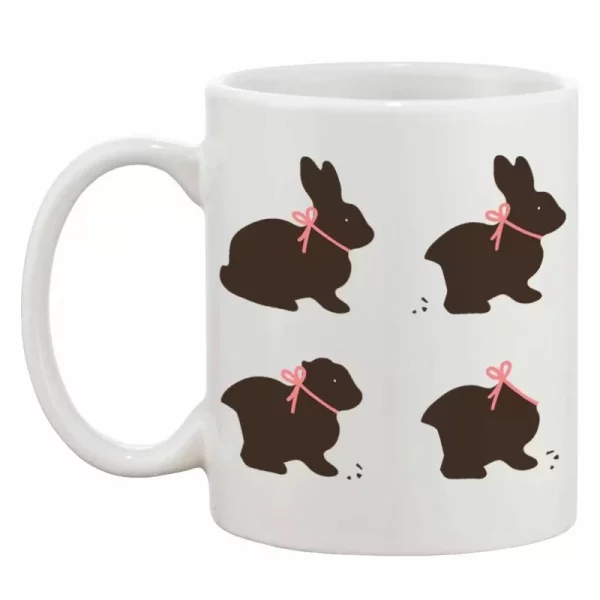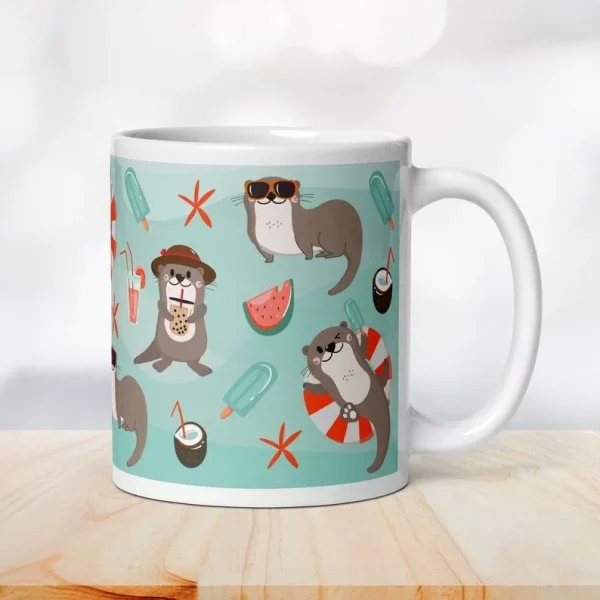
How Intelligent Are Our Pets?
How Intelligent Are Our Pets? Stimulating Their Intelligence with Games and Entertainment 🐶🐱🧠
Those of us who love our pets know how intelligent they can be. I have a bichon maltese, and although he is a small breed dog, his intelligence and learning is excellent. I have had cats that would amaze anyone who doesn’t own pets, how clever and alert they are and how quickly they learn any habit. They are certainly amazing, and a gift from God.
Pets are not just lovable companions; they are also incredibly intelligent beings. Whether it’s the problem-solving prowess of a cat or the social savvy of a dog, our furry friends have remarkable cognitive abilities that can be nurtured and enhanced through proper stimulation. In this article, we’ll explore the fascinating world of pet intelligence and share effective ways to stimulate their minds with engaging games and activities. Plus, you can commemorate their cleverness with personalized pet portraits from Meliav 🖼️❤️.
The Science of Pet Intelligence 🧬📊
Understanding Pet Intelligence
Intelligence in pets can be defined as their ability to learn from experience, solve problems, and adapt to new situations. Studies have shown that pets possess a range of cognitive abilities, from memory and learning to problem-solving and communication. For instance, dogs are known for their understanding of human emotions and commands, while cats excel in spatial awareness and memory tasks (Nature, 2024).
Cognitive Abilities of Dogs 🐕
Dogs have been the subject of extensive research due to their close relationship with humans. They are capable of understanding up to 250 words and gestures, solving complex problems, and even displaying empathy. Dogs also have an excellent memory, which helps them learn routines and commands efficiently (National Geographic, 2024).
Cognitive Abilities of Cats 🐈
Cats, often considered aloof, are actually highly intelligent and curious creatures. They have an exceptional ability to remember locations and objects, which is why they excel in navigating their environments. Cats are also skilled hunters, using a combination of stealth and strategy to catch their prey. Their problem-solving skills are often displayed in their ability to open doors, find hidden treats, and navigate complex environments (Hillspet.com, 2024).
Stimulating Your Pet’s Intelligence 🌟
Interactive Toys and Puzzles 🧩
Interactive toys and puzzles are excellent tools for stimulating your pet’s mind. These toys challenge pets to think and solve problems to get a reward, which can be food or a favorite toy. For dogs, puzzle feeders and treat-dispensing toys can keep them engaged and mentally stimulated. For cats, toys that mimic the movement of prey, like laser pointers and feather wands, can trigger their hunting instincts and keep their minds sharp.
Training and Obedience Classes 🎓
Training sessions are not just about teaching pets commands; they are also great mental exercises. Dogs, in particular, benefit from obedience training as it challenges their ability to understand and follow instructions. Advanced training classes, such as agility or scent work, can further enhance their cognitive abilities. Cats can also be trained to perform tricks and follow commands using positive reinforcement techniques.
Sensory Stimulation 🌿🎶
Sensory stimulation involves engaging your pet’s senses to enhance their mental well-being. For dogs, taking them to new environments, like parks or trails, allows them to experience new smells, sounds, and sights, which is mentally enriching. For cats, creating a sensory environment at home with different textures, sounds, and scents can keep them curious and engaged. Introducing cat-safe plants, like catnip or silver vine, can provide additional sensory stimulation.
Engaging Games for Smart Pets 🎲
Hide and Seek 🕵️♂️
Hide and seek is a fun game that can be played with both dogs and cats. Hide treats or toys in different locations and encourage your pet to find them. This game taps into their natural hunting instincts and provides excellent mental stimulation. For dogs, you can increase the difficulty by hiding items in more challenging spots. For cats, use toys that they can chase and pounce on.
Fetch and Retrieve 🏃♂️
Fetch is a classic game for dogs that provides both physical and mental exercise. Teaching your dog to fetch specific items, like a named toy, can enhance their problem-solving skills and vocabulary. For cats, use lightweight toys that they can bat around and chase. Some cats also enjoy playing fetch with small, easy-to-carry toys.
Puzzle Games 🧠
Puzzle games are fantastic for engaging your pet’s mind. Invest in puzzle toys that require your pet to figure out how to release a treat. These toys often have compartments or levers that need to be manipulated to access the reward. Both dogs and cats can spend hours figuring out these puzzles, which helps improve their cognitive abilities.
Training New Tricks 🎩
Teaching new tricks is a great way to stimulate your pet’s brain. For dogs, tricks like rolling over, playing dead, or even more complex tasks like retrieving specific items can be both challenging and rewarding. For cats, tricks like high-fives, sitting, or jumping through hoops can be taught using clicker training and treats.
Importance of Social Interaction 🗣️
Playdates and Socialization 🐾
Social interaction is crucial for your pet’s mental health. Organize playdates with other pets to encourage socialization and reduce boredom. Dogs, in particular, benefit from playing with other dogs as it helps them develop social skills and provides mental stimulation. For cats, introducing new feline friends can be tricky, but gradual and supervised introductions can lead to enriching social interactions.
Family Involvement 👨👩👧👦
Involve your family in your pet’s playtime and training. This not only provides your pet with diverse interactions but also strengthens the bond between the pet and each family member. Different family members can take turns playing with the pet, teaching new tricks, or taking them on walks, ensuring that your pet remains engaged and mentally stimulated.
The Role of Routine and Structure 📅
Consistent Routines ⏰
Pets thrive on routine. Having a consistent schedule for feeding, playtime, and walks provides structure and predictability, which is beneficial for their mental health. Routines also help in reinforcing good behavior and reducing anxiety. For dogs, consistent training sessions and regular exercise are essential. For cats, maintaining a routine for playtime and feeding can reduce stress and promote mental well-being.
Enriching Environments 🏡
Creating an enriching environment at home is key to keeping your pet mentally stimulated. For dogs, this could mean having a variety of toys, access to outdoor spaces, and regular interaction with family members. For cats, vertical spaces like cat trees, scratching posts, and cozy hiding spots can provide mental stimulation and physical exercise. Rotating toys and introducing new activities can also keep your pet engaged.
Celebrate Your Pet’s Intelligence with Meliav 🖼️✨
Immortalize the cleverness and unique personality of your furry friend with a personalized pet portrait from Meliav. These beautiful artworks capture the essence of your pet and make for a wonderful addition to your home decor. Visit Meliav’s shop to explore more options and celebrate your pet’s brilliance.
Further Reading and Resources 📚
- Wikipedia: Learn more about animal cognition on Wikipedia.
- New York Times: For insights on pet intelligence, read this New York Times article.
- Nature: Explore scientific research on pet intelligence in this Nature article.
- Hill’s Pet Nutrition: Discover tips on keeping pets mentally stimulated in this Hill’s Pet Nutrition guide.
- National Geographic: Understand the cognitive abilities of pets in this National Geographic article.
Conclusion 🏆
Pets are incredibly intelligent creatures, capable of learning, problem-solving, and forming deep emotional bonds with their owners. By understanding their cognitive abilities and providing appropriate mental stimulation through games, training, and enriched environments, we can enhance their intelligence and overall well-being. Celebrate your pet’s brilliance and unique personality with a personalized pet portrait from Meliav. Embrace the joy and fulfillment that comes with nurturing your pet’s mind and enjoy the many benefits of having a smart, happy companion in your life. 🌟🐾
For more tips and beautiful pet portraits, visit Meliav’s collection today!
Don’t be discouraged if you see that your pet is having a hard time learning. Of all the pets I have had, I have always had some disappointment with different behaviors of them, but with patience, love and affection they end up being solved. Never forget that they give much more to us than we give to them.
❤️ Immortalize your pet with an unforgettable portrait.🐶😺
Supplements and Vitamins to Boost Intelligence in Young and Senior Pets: A Guide for Dogs and Cats 🐶🐱🧠
For many years I was giving supplements to my puppy Dogi. He was a Jack Russel Terrier who at the age of 7 years old started to have liver problems. The vet even thought he was going to die. But we didn’t sit idly by. We asked an expert breeder, and he suggested that we change our Dogi’s food, and use a vitamin and mineral supplement. Our dog improved and even seemed to get younger. He never had liver pain again. Although he did have cirrhosis, but it did not cause him pain. he reached 18 years of age. I will never forget those years, and how good it was that a professional did not give such a valuable recommendation.
Our pets are beloved members of our families, and we want to ensure they live their best lives, full of health, happiness, and mental sharpness. One way to support their cognitive health is through the right supplements and vitamins. In this comprehensive guide, we’ll delve into the best supplements for stimulating intelligence in both young and senior dogs and cats. 🌟📚
Looking to capture your pet’s essence in a unique and personalized way? Check out these custom pet portraits from Meliav 🖼️.
Understanding Pet Cognitive Health 🧬📊
The Importance of Cognitive Health
Cognitive health is vital for pets, just as it is for humans. A healthy brain allows pets to learn, adapt, and thrive in their environments. As pets age, cognitive decline can occur, leading to issues such as memory loss, confusion, and decreased problem-solving abilities. Supplements can play a crucial role in supporting and enhancing brain health at all stages of life (Nature, 2024).
Young Pets: Building a Strong Foundation 🐾
For puppies and kittens, cognitive development is crucial as their brains are rapidly growing. Ensuring they receive the right nutrients can enhance their learning capabilities and set them up for a lifetime of intelligence and adaptability (Hillspet.com, 2024).
Senior Pets: Maintaining Mental Sharpness 🦴
As pets age, their cognitive functions can decline. Supplements and vitamins can help maintain and even improve mental sharpness, allowing senior pets to continue enjoying their lives with vitality and awareness (National Geographic, 2024).
Essential Supplements for Dogs 🐕
Young Dogs
1. Omega-3 Fatty Acids 🐟
Omega-3 fatty acids, particularly DHA and EPA, are crucial for brain development in young dogs. These fatty acids support neural growth and cognitive function. Studies have shown that puppies receiving DHA supplements have better memory and learning capabilities (New York Times, 2024).
2. Choline 🌾
Choline is essential for the development of the brain and nervous system. It plays a key role in the formation of neurotransmitters that facilitate communication between brain cells. Choline can be found in egg yolks and certain meats or as a standalone supplement.
3. B Vitamins 🌿
B vitamins, particularly B6, B12, and folic acid, support brain health by aiding in the production of neurotransmitters and maintaining energy levels. These vitamins can be found in balanced commercial diets or as specific supplements.
Senior Dogs
1. Antioxidants 🍇
Antioxidants like vitamin E, vitamin C, and beta-carotene help combat oxidative stress, which can damage brain cells. These supplements can help maintain cognitive function in senior dogs by protecting their brains from age-related damage.
2. SAMe (S-Adenosylmethionine) 💊
SAMe is a supplement that supports liver function and has been shown to improve mood and cognitive function in aging dogs. It works by enhancing neurotransmitter function and reducing oxidative damage.
3. Phosphatidylserine 🧠
Phosphatidylserine is a phospholipid that supports brain cell function. It has been shown to improve memory and cognitive function in older dogs. This supplement can help senior dogs stay sharp and responsive.
Essential Supplements for Cats 🐈
Young Cats
1. Taurine 🥩
Taurine is an essential amino acid for cats, crucial for brain development and function. A deficiency in taurine can lead to cognitive impairments. Ensuring that kittens receive adequate taurine is vital for their mental and physical health.
2. Omega-3 Fatty Acids 🐟
Just like in dogs, omega-3 fatty acids are important for brain development in kittens. DHA, in particular, supports cognitive function and visual development.
3. Arachidonic Acid 🧬
Arachidonic acid is another essential fatty acid for cats that supports brain health. It is important for neural development and cognitive function.
Senior Cats
1. Antioxidants 🍒
Antioxidants can help protect senior cats’ brains from oxidative stress and age-related cognitive decline. Vitamins E and C, as well as flavonoids, can be particularly beneficial.
2. MCTs (Medium-Chain Triglycerides) 🥥
MCTs provide an alternative energy source for the brain. Studies have shown that MCTs can improve cognitive function in aging cats by providing ketones, which the brain can use for energy when glucose metabolism is impaired.
3. B Vitamins 🌾
B vitamins are essential for maintaining cognitive health in senior cats. They support energy metabolism and neurotransmitter production, helping to keep the brain functioning optimally.
Incorporating Supplements into Your Pet’s Diet 🥗
Consult Your Veterinarian 🩺
Before introducing any new supplements into your pet’s diet, it’s important to consult with your veterinarian. They can provide guidance on appropriate dosages and ensure that the supplements will not interact with any medications your pet may be taking.
Quality Matters 🌟
Choose high-quality supplements from reputable manufacturers. Look for products that have been tested for purity and potency to ensure that your pet is getting the best possible nutrients.
Balanced Diet 🥕
Supplements should not replace a balanced diet. Ensure that your pet’s primary food is nutritionally complete and appropriate for their life stage. Supplements should be used to enhance an already healthy diet.
Fun and Effective Ways to Give Supplements 🎉
Mixing with Food 🍲
Many supplements can be mixed directly with your pet’s food. This is often the easiest way to ensure they are consumed. For picky eaters, using a bit of wet food or a favorite treat can help disguise the taste.
Treat Form 🦴
Some supplements are available in treat form, making them easier to administer. These can be particularly useful for pets who resist taking pills or powders.
Using Pill Pockets 🥜
Pill pockets are treats with a hollow center designed to hold pills. They can be a great way to give your pet supplements without the struggle of forcing a pill into their mouth.
Celebrating Your Pet’s Intelligence 🎓
Capture the essence of your pet’s brilliant mind with a personalized pet portrait from Meliav. These unique artworks not only celebrate your pet’s intelligence but also add a personal touch to your home decor.
Further Reading and Resources 📚
- Wikipedia: Learn more about the cognitive health of pets on Wikipedia.
- New York Times: Read about the benefits of supplements for pets in this New York Times article.
- Nature: Discover scientific insights on pet supplements in this Nature article.
- Hill’s Pet Nutrition: Find out more about pet nutrition in this Hill’s Pet Nutrition guide.
- National Geographic: Understand the science behind pet cognition in this National Geographic article.
Conclusion 🏆
Ensuring that your pets receive the right supplements and vitamins can significantly boost their cognitive health and intelligence. Whether you have a young puppy or kitten or a senior pet, incorporating these essential nutrients into their diet can help them lead a more vibrant and mentally sharp life. Celebrate their brilliance and uniqueness with a custom pet portrait from Meliav 🖼️.
No matter what pet you have, as I always say, they give us much more than we give them.
Would you like your pet's portrait in more places?. These beautiful gifts are for you:
Funniest pet portraits ever seen ❤️
Promotions: Custom Pet Portrait offers in Black Friday

